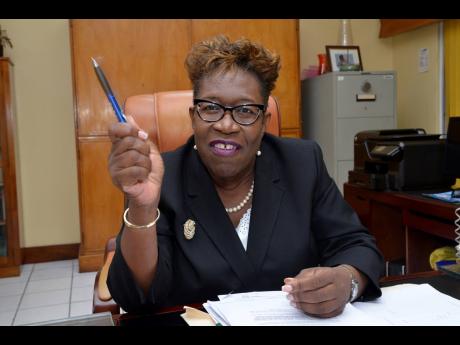DPP: Prosecutors to call cops for questionable JP letters
WESTERN BUREAU:
Director of Public Prosecutions (DPP) Paula Llewellyn says that she has instructed the members of her office to contact the authorities if they receive letters that are purported to have been witnessed by justices of the peace (JPs) for the purpose of recanting witness testimonies.
According to Llewellyn, her office has received reports of such letters being submitted to prosecutors, including in instances where evidence has already been provided by the affected witnesses.
She was speaking on Thursday at a commissioning ceremony for 48 new JPs for St James, which was held at the Montego Bay Convention Centre in Rose Hall, St James.
“We have noticed several instances over the last year or two, where my Crown counsels are ready to prosecute a case, the witnesses are supposed to be there, and the defence attorney is saying, ‘Have you spoken to your main eyewitness? Well, I have a letter which was witnessed by a JP where the witness is now saying that what he told the police in his original statement did not happen’,” said Llewellyn.
“When they ask, ‘How did you come by this, and who is the JP?’, they get a copy of the letter handed to them. I have directed my staff that whenever that happens, they are to immediately call the police authorities and have everybody investigated for possibly attempting to pervert the course of justice,” Llewellyn added.
She was speaking on the heels of a Sunday Gleaner investigative series that revealed that some JPs across multiple parishes have been charging fees for their services and lying in letters of recommendation they write for complete strangers.
It is understood that one JP has since surrendered his seal of office and resigned his post following investigations by the Ministry of Justice.
Llewellyn declared that any JP who is found to be acting contrary to the stipulations of their office will face the full force of the law.
“There is no JP who, once the evidence is there for an offence like attempting to pervert the course of justice, who is not going to get that indictment. The higher up you go, you are supposed to know better,” said Llewellyn.
Meanwhile, speaking to The Gleaner following the function, Justice Minister Delroy Chuck maintained his stance that the office of a JP is a voluntary service for which holders should not be paid.
“There is no question about the paying of JPs to identify persons, to witness documents, or do recommendations because if you do that, you would definitely encourage more corruption. Any JP would then be able to set up an office and say, ‘I can identify you. I will give you recommendations,’ without even knowing who the persons are,” said Chuck.
“We have a real challenge emphasising to JPs that they must not charge at all. There is no doubt that a number of JPs go beyond the call of duty and do incur expenses, but that is a part of volunteerism,” Chuck added.
The Justice of the Peace Act requires holders of the office to provide their services free of charge.

